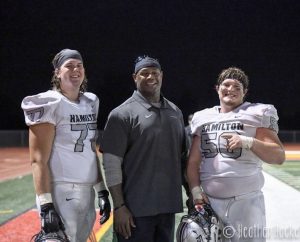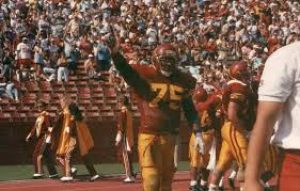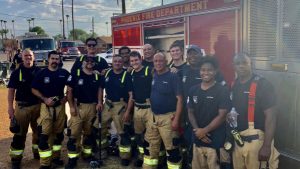- Slug: Sports-Hamilton Gladiator, 2,300 words.
- Photo available.
By Talia Massi
Cronkite News
CHANDLER – He never wanted to be just some average kid from Los Angeles.
Mark Tucker might be best known today as the offensive line coach for Hamilton High School. But his list of accomplishments is much longer than that.
He is a mentor, role model and protector for many, and embodies the spirit of Hamilton High. He has given much to each and every community that has been a part of his life.
When asked the simple question – Why? – silence followed.
Then the silence was filled with a tear (or two), and then a simple answer: “I don’t know.”
There is, of course, a much broader explanation. But to understand Tucker’s extraordinary influence, it’s best to start at the beginning of his extraordinary story.
Tucker grew up in a single-parent home with his mom, Merceil, in Los Angeles.
They were on public assistance, but his mom worked under-the-table jobs to make ends meet. They were not poor, but they were not rich either.
Education was a huge emphasis in his life growing up, mostly because his mom never went to high school or college.
She would tell him, “I didn’t get my education, but I am going to make sure that you get yours.”
Merceil was persistent in making sure her son did his homework and stayed on top of things.
“I knew she was a single, independent Black woman trying to raise a young guy in the middle of … L.A. where I could have (gotten) sidetracked by a lot of things that probably were not the most positive,” Tucker said. “But I kept my nose clean.”
Tucker ended up at Banning High School in Wilmington, California.
He didn’t want to be just some average kid, so he decided to play football. It then turned into an opportunity for him to get a higher education.
Banning was a football powerhouse in the 1970s and 80s. Tucker was an offensive lineman and excelled quickly. He was named to the All-State Underclass team as a junior, the South Bay Lineman of the Year as a senior, among others honors.
His senior year, they beat their rival, Carson High School, in the final round of playoffs. The game was a rematch of the previous, but this time, Tucker and his teammates were able to call themselves L.A. city champions.
His persistence and athletic excellence gave him a full-ride scholarship to the University of Southern California.
Tucker grew up two blocks from the university. He would walk through campus regularly and watch football practice. Little did he know at the time, but Tucker was watching future NFL stars like Ronnie Lott, Marcus Allen and Charles White, just to name a few.
“Never in a million years did I even fathom the idea that I would actually be able to go to that school, play football and actually get my degree,” Tucker said.
At USC, Tucker was a four-year starter at offensive guard. He was All Pac-10 as a sophomore and senior, second team as a junior and first team All-American as a senior. USC went 35-12-2 when Tucker was there and went to three Rose Bowls.
Tucker hates politics, but oddly enough, one of his biggest accomplishments in his life was graduating with a bachelor’s degree in political science.
When Tucker was in college, the go-to major was public administration. He didn’t even know what it meant at the time, but he did know that he wasn’t going to be like everyone else.
“I was intelligent. I was a smart guy, and I wanted to show that I was just more than a jock, so I majored in political science, because I was on the fence about going to law school,” Tucker said.
Tucker eventually wanted to get into entertainment law. He knew that by growing up in Los Angeles, he could “springboard” into that field.
“It was more of a pride thing, just being able to major in something I knew a lot of guys didn’t major in, and what the foundation of what that would have led to if I decided to take that route,” Tucker added.
Tucker was the second person in his family to secure a degree. His uncle was involved in the Aerospace industry and graduated from UCLA.
But instead of law school, Tucker was drafted in the seventh round by the Atlanta Falcons in the 1991 NFL Draft.
He was honored to be drafted, because it didn’t happen to everyone.
During his NFL career, he was a journeyman. He hopped around from team to team, spending time with the Indianapolis Colts, the Arizona Cardinals, the Jacksonville Jaguars and the New Orleans Saints.
“I envisioned … stacking away a bunch of money and making my life comfortable to myself … I was still able to live a nice, comfortable lifestyle, (but) in a nutshell, it was kind of unfulfilling because I didn’t attain the goal that I set out to,” Tucker said.
No matter the reality, Tucker is grateful to have had that opportunity.
When Tucker was with the Colts, he attended training camp and was later released. With the season off, he needed something to fill the space.
White, one of the USC alum Tucker grew up watching who won the Heisman Trophy and later went on to star in the NFL, approached Tucker about being on “American Gladiator,” a popular TV show.
White was a contestant on the show in the past and knew the production crew was looking for some fresh faces.
When White asked Tucker about being on the show, Tucker gave him the side-eye and looked at him as if it was a joke.
But Tucker soon became the newest American Gladiator.
Tucker knew one of the trainers who worked with two Gladiators, Turbo and Sky. Tucker went out to join them.
Tucker’s usual workout attire was a bandana tied over his head, cut up shirts and, at the time, he was wearing earrings. Sky’s first impression was that Tucker was a “rebel” and the name stuck.
When it was finally time to be in the studio, Tucker was listed as an alternate until one day he walked into the dressing room to find his costume hanging in front of him. He looked at the cast list, and right there was printed “Mark Tucker.”
“I was like a big … kid at this point, like, ‘Oh my God I can’t believe this,’” Tucker said.
They taped 10 hours a day for a month straight. It ended being two shows every day.
Tucker appeared in about seven shows. He was excited to be a part of TV history.
“It was the most fun I think I have ever had in my life. You know I played football for a long time and I have had some great moments, but that was the most unexpected experience I have ever had in my life. It was amazing. I would wake up in the morning to go tape a show and I was just standing there. I couldn’t believe it. I would pull up to the lot, I would get out and walk in and it was like I was truly living the dream,” Tucker said.
After his NFL career came to a close, he moved on to the Arena Football League with the Arizona Rattlers as a player and later, a coach.
But after all the fame and glory of being a professional athlete and being on TV, Tucker was at a crossroads trying to find his purpose.
He was drawn to being a teacher.
He started off helping out at a Juvenile Corrections Facility. He became a mentor to at-risk youth at Arizona Boys Ranch.
It was challenging.
“My boss told me, ‘Hey Tuck, just remember you can’t save every kid.’ And I said, ‘I know.’ Trust me, I’m from … L.A. Enough of my buddies are dead or in jail because you get headed down that path and it’s hard to get off from it,” Tucker said.
But three years came and went, and Tucker started to develop fatigue from being a mentor to, arguably, some of the most difficult “students.”
He made the switch to teach children in a more positive and motivating environment – Hamilton High School.
Tucker started out as a substitute, just to get his feet wet and see how he would do.
But the demands on teachers increased and the paycheck didn’t.
Tucker had to provide for his family, so he became a Phoenix fireman.
He loved to work out and the training was very similar to being an athlete.
“It’s a natural fit for guys that are athletes. It just further carries on that aspect of your life you lose as an athlete, you pick up as a firefighter,” Tucker said.
He started out doing ride-alongs and was just recently promoted to engineer with E11 “C” Shift: “The guy who gets to drive the big red truck,” he joked.
“It’s the best job I’ve had besides being a professional football player,” Tucker said.
He spends 24 hours every third day down at the station. His “team” is his family.
“The fire station is like a big locker room. We hang out, we cook together, we work out together … but when the tone goes off, you put your professional face on … get on the truck … and provide the highest level of customer service,” Tucker added.
Tucker has a biological family, too, his two sons, Mark Jr. and Marquez, plus a stepson. He was married for 20 years before getting divorced.
His youngest son, Marquez, went to Southern Utah on scholarship and has bounced around between a few NFL teams including the Chicago Bears. He played in the XFL and has been working out in hope of being called to a tryout or a camp.
The longest and most current of all Tucker’s endeavors is being the offensive line coach at Hamilton. He started at the school when it first opened in 1998, and the rest is history.
“Coach Tuck is Hamilton football,” coach Mike Zdebski said.
Tucker loves Hamilton because he has never felt more accepted by his colleagues and he simply loves being around the kids.
He is driven by his ability to shape his players and prepare them for real-world problems and situations.
And after more than two decades, Tucker still feels right at home.
“It’s the people, it’s the kids, it’s not the building, but it’s everything about this building,” Tucker said.
It’s not just the football program that is successful, but as a whole, the school excels at almost everything they do.
The founding principal Fred DePrez had a vision and saw it though.
He wanted to develop a school that was the best in both academics and athletics. Everything is held at a very high standard.
When Tucker started at Hamilton, the surrounding area was deserted. The school was in the middle of a butcher farm and cotton fields.
The past 20 years, the surrounding area has been built up with homes and businesses.
Like many schools, Hamilton’s football program is central to the school as a whole and has full administration support.
DePrez found that “magic formula.”
With Hamilton, Tucker has seven state championships and is looking to grow that collection.
He describes his coaching style as “abrasive,” but “you got to love them up once you tear them down.”
“He preaches hard work, accountability and responsibility. We are fortunate to have the best line coach in Arizona,” Zdebski said.
Despite how long he has been at Hamilton, Tucker has no desire to become a head coach.
“A head coach of high school football now … they are not even coaches, they are CEOs … because they are involved in so much of the fundraising and dealing with the booster club. They are managing everything … they oversee the entire program, and to me that would take away what I bring to the table and how I connect to kids,” Tucker said.
The offensive line is where he belongs.
At Hamilton, Tucker’s offensive line is referred to as Tuck’s Tanks, and they are the foundation of what makes Hamilton football great.
“I know for a fact that I have built a solid reputation on this side of town being here as a substitute, a football coach, a mentor and an influence,” Tucker added.
But it all comes back to that one question.
Why?
After that powerful moment of silence, Tucker said.
“As an offensive lineman you are a protector of your quarterback and your running backs and … it branched off into these aspects of my life,” he said. “I guess you can say I like protecting people and the whole thing of protecting people, paying it forward, being a mentor and providing guidance to young people. I guess I just have a helpful giving persona or attitude and it’s just lended to everything I have done as an adult. Things just kind of worked out in a really great way and people always … use it as a loose term when … they are living the dream and I can honestly say that I am living the dream.”
He started to reminisce on his previous years and ended with this:
“If you would have told me when I was a little chubby 10-year-old kid that in your lifetime you are going to do all those things that you did, play at a university such as USC, get drafted in the NFL and become a professional firefighter later. God has guided me down a great path in life. I’m thankful for it.”
For more stories from Cronkite News, visit cronkitenews.azpbs.org.


